Saturday, December 17, 2005
No good deed goes uncriticized
The hospital is needed because in Venezuela there are 3,500 babies born every year with heart defects but the current hospital system can only care for 1,200. Hence the need for this hospital which, it is said, will be the largest of its kind in the world.
Somehow though I don't think it will be too popular with the Venezuelan opposition. Why not you ask? Well, a clue resides in the name of the new hospital - Hospital Cardiologico Infantil Latinoamericano, or the LatinAmerican Babies Cardiological Hospital. So the catch is, as the name implies, this hospital will not only serve Venezuelan children but children from all over Latin America. In fact when it is fully operational next year it is expected to attend to 3,500 childrend from Latin American countries outside of Venezuela.
That is sure to put the opposition into a tizzy if it hasn't already. The opposition has been harshly critical of the aid being given to other Latin countries saying that it should instead be spent in Venezuela. Now, there is no shortage of pressing needs within Venezuela. That is for sure. But the economic situation and standard of living in Venezuela have been improving dramtically in the past couple of years. So it doesn't seem at all unreasonable for Venezuela to share some of its oil windfall with others who are in need.
Furthermore the oppositon's whinning about this is completely hypocritical. For starters if they really care about Venezuela they never would have launched their oil strike that pissed away something like $15 billion dollars - a heck of a lot more money than what Chavez has spent abroad. More importanly, it is estimated that Venezuelans hold about $75 billion overseas, principally in the United States. Whose money is that? Largely the money of wealthy Venezuelans who are supporters of the opposition. So if they really cared at all about Venezuela couldn't they repatriate some of that money? I sure think so. (moreover maybe what really pisses them off about Chavez's social spending is every dollar spent on those programs is one dollar less they can steal and take to Miami).
Another aspect of the opposition's hypocracy was evidenced yesterday by opposition leader Julio Borges. He complained bitterly about an oil refinery that Venezuela will be building in Brazil. He claims the oil refinery and the jobs that go with it should be in Venezuela. Fair enough. But I never heard him complain about the governments prior to Chavez spending billions to buy the U.S. oil company Citgo. Lets see if I understand - spending billions in the U.S. to give jobs to gringos is ok but building a refinery in Brazil to help a fellow Latin country is somehow bad.
I have to say, sarcastically, that the logic escapes me. But in reality the logic is crystal clear. With all its criticism what the opposition is really saying is: "We hate Chavez spending all the money this way because its OUR money that should be spent only on us or at the very least we should get our cut just like we did in the good old days. It was so much better when government monies were a big piggybank for the already wealthy rather than having them wasted on a bunch of undeserving people who smell bad."
To them I can only say, its a brave new world, deal with it.
|
Where the crowds are
Now we get some hard numbers to back up my subjective impressions. According to the polling firm Datanalisis sales at Venezuelan shopping centers have gone up by a almost unreal 41% compared to last year. Datanalysis give all sorts of data in the article, such how much the value of each purchase has gone up and how more people are now going to the malls not to simply window shop but to actually make purchases.
All this data is stuff only a shopping mall developer could love. But it does make a larger point. In spite of years of the opposition insisting the sky is falling the reality is the country is booming and the sky seems to be the limit. And that is really the main problem that ailes the Venezuelan opposition - while they sit around and wallow in self pity and how bad things supposedly are your average Venezuelan is out enjoying life at the local mall.
|
Urban farming
Moreover, much of the land that was once prime farm land has now been gobbled up by urban areas. The valley in which Caracas resides is a prime example of this. It is very good land with abundant rainfall. I saw a picture of Caracas from 1948 that showed it looking east from where the Central University is. In that picture it was just farms with scattered homes. Now that area is just a huge urban jungle with huge skyscrapers and no open space left. So with every year that passes Venezuela probably has fewer areas left for farming.
Nevertheless attempts have been made to reclaim at least some land. For example, right in the heart of Caracas, next to the huge Parque Central office and housing complex, some open space has been turned into a medium sized farm where they are cultivating various vegitables. Here are a copule of pictures of it:
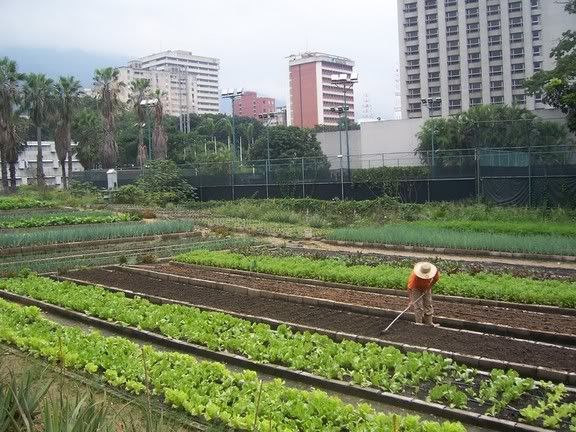
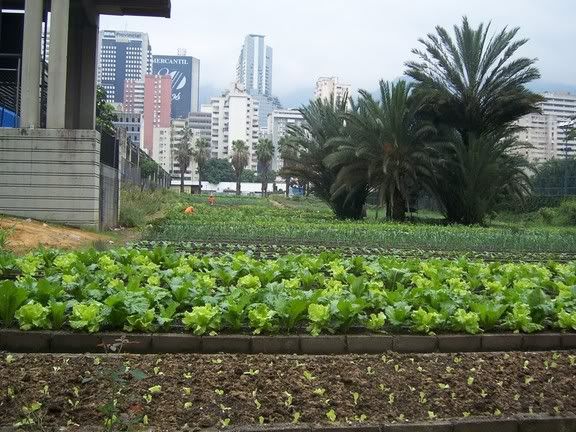
Given its location this farm is completely fenced off and I didn't get the chance to talk to any of the farmers about what they are growing and what they do with what they produce. So while it looked interesting its hard to know what kind of an impact these efforts have. Further, I didn't see any other similiar urban farming efforts so I don't know how widespread these efforts are. Nevertheless, this does show the Venezuelan government isn't simply sitting on its hands in the face of its land shortage.
And just to show what leangths Venezuelan's go to to farm here is a picture of part of a farm outside the town of Rio Claro in the state of Lara. The picture doesn't capture it that well but these slopes, where they were farming everything from onions to papaya and bananas, were very steep. It was hard to walk up and down them and there is no way they can use tractors on them. All plowing is done with oxen. This type of land simply wouldn't be farmed in the United States but in Venezuela it is. Venezuelan's may not grow most of their own food but it certainly isn't for lack of trying.
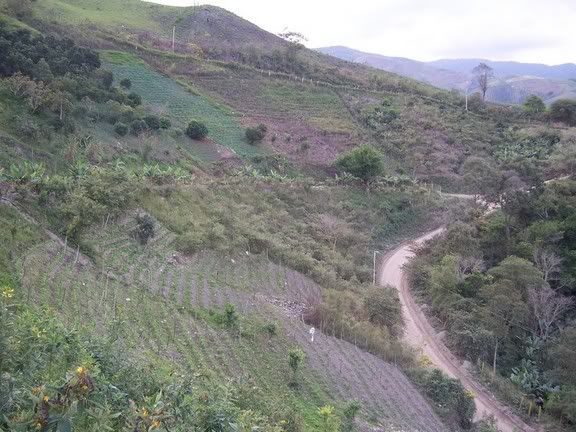
|
Friday, December 16, 2005
Striking at the heart of exclusion
Venezuela looks to boost social spending
By Jane Monahan
In Caracas, Venezuela
Venezuela's populist president, Hugo Chavez, is widely expected to spend more on his government's social programmes, both at home and abroad.
The opportunity comes following his party's landslide victory in parliamentary elections on December 4th, after opposition parties boycotted the elections and withdrew their candidates.
Just consider the government's recently proposed 2006 budget, where a colossal 41% of total expenditure, or $16.6bn (£9.4bn), earmarked for social programmes, is now bound to sail through parliament unopposed.
Both Anna Lucia d'Emilio, the director of the United Nations Children's Fund (Unicef) in Venezuela, and Ramon Mayorga, the representative of the Inter American Development Bank (IADB), all agree that the country's social programmes are easily the biggest and most comprehensive in Latin America.
The target of the huge spending is Venezuela's huge poverty problem, afflicting more than half the population, and the profound social and economic inequalities which cause it.
It encompasses three domestic programmes, says Mr Mayorga, that "strike at the heart of exclusion and which are very successful and being done at a reasonable, sustainable cost".
Campaigns
One is Mision Robinson, a highly effective literacy campaign which began - along with most of the other social efforts - in 2003..
Another is Mercal, a discounted food-and- household- goods shopping project established in poor urban and rural areas where no supermarkets or general food stores existed before.
Thirdly, Mayorga says, there is Mision Barrio Adentro, which translates as "into the heart of the shanty-town" - a basic preventative medicine programme.
In the last analysis the sustainability of the programmes is not only about money... The government has resources
Anna Lucia D'Emilio, Unicef
It was organised outside the bureacracy of the Health Ministry, and by 2005 was providing free primary health care and subsidised medicines to 60% of the population - or over 14 million people - who previously had no medical services at all.
That such a programme is popular is hardly surprising. Even surveys done by opponents of the Chavez government show almost 70% of the population considers this basic health care programme necessary, and the opposition admits it.
Critics have raised questions about the financial sustainability of Barrio Adentro, as well about the complications of integrating the country's two parallel health services.
One key difference between the two, for instance, is that instead of using Venezuelan doctors - many of whom have little experience of dealing with the poor - Barrio Adentro is staffed by 14,000 Cuban medics who have experience working in developing countries.
However, Enrique Rodriguez, a high ranking official at the Ministry of Planning and Development, says rivalry between the health practitioners can be resolved.
The government, he says, has started offering scholarships to train about 20,000 young Venezuelans in Cuba and Venezuela to replace the Cuban staff. It is also carrying out a simultaneous five-year reform of public hospital staff and services.
Co-operatives
But a more significant problem - both of integration and of financial sustainability - may be posed by Vuelvan Caras ("Turning Lives Around"), a social programme aimed at creating jobs and reducing unemployment.
It is "not so successful", admits the IADB's Mr Mayorga.
Take a Vuelvan Caras centre built at an abandoned fuel depot in a poor western suburb of Caracas, where brightly painted murals of Venezuela's independence war heroes near the entrance contrast with the drab low-rise cinder blocks and ramshackle structures of the city's shanty town.
Here, a group of elderly people work in a vegetable co-operative; 220 unskilled women, many of them housewives who have never had a job before, work in a textile co-operative; and 139 men, many of whom have not had employment for a long time, work in a shoe co-operative.
The centre, now part of a huge network of 4,600 co-operatives of every size and activity throughout the country, is evidently providing temporary employment. But how long can the cooperatives last?
The question is an important one, critics of President Chavez say, the government has vowed the co-operatives must not be a burden on the State.
But it has not yet made clear how the co-operatives, which have limited management and marketing skills and resources, will fit into a market economy and compete with private firms.
Off budget?
Still, the recovery of the economy following the ending of oil strikes in early 2003 means funding can come out of the traditional government budget - rather than, as was earlier the case, from the coffers of state oil firm PDVSA.
PDVSA had been the main funder during the pre-2003 recession. But even now it has contributed some $2bn in 2005 - about a quarter of its annual profits.
But for supporters of Venezuela's far-reaching programmes, where the money comes from is only a small part of what is at stake.
Rather, the key issue is what happens to the groups it serves.
"In the last analysis the sustainability of the programmes is not only about money," says Unicef's Anna Lucia D'Emilio.
"The government has resources. But it also depends on how empowered the disadvantaged groups become, how they view themselves and others."
So UNICEF and the Inter-American Bank both agree Chavez's social programs are easily the largest and most comprehensive in Latin American, they strike at the heart of exclusion, are successful, and are being done at a reasonable and sustainable cost. Despite all that I'm sure the Venezuelan opposition will criticize them. Yeah thats right, that nasty dictator Chavez doesn't really care about the poor; he is only doing this to get people to vote for him.
|
Thursday, December 15, 2005
Olive Branch or Diplomatic Flinch? - Bush's Feelings Hurt
CARACAS, Venezuela (Reuters) - The United States urged Venezuela on Thursday to tone down harsh attacks on President George W. Bush to improve frayed relations between Washington and a key oil supplier.
Left-wing President Hugo Chavez has become Bush's most vocal critic in South America and often refers to his U.S. counterpart as "Mr Danger" or "terrorist" to criticize what he brands as Washington's imperialist foreign policies.
"Perhaps we can tone down the rhetoric a little in 2006, I hope we can pass 12 months without hearing the words Mr Danger or assassin or terrorist," said William Brownfield, U.S. Ambassador to Caracas, listing remarks Chavez, government officials and lawmakers have brandished to attack Bush.
"We're going to keep concentrating and focusing on the serious elements of this bilateral relationship, one that is important," he told Globovision television in an interview.
Is this an attempt to build better relations or are the verbal jabs reaching thier mark? Some have stated that there is an apparent discrepancy between the Venezuelan anti-US rhetoric and its business dealings, in particular the sale of petroleum to the US. It is interesting to note that while these detractors think they have a basis for citing the Venezuelan Governments dual standards, it is in fact, the opposite that remains true.
The US will ensure its energy resource consumption by any means available. The means available to it at the present time mandate that it keep a military distance from Venezuela, due to its "obligations" elsewhere. That does not preclude non-military actions, in the effort to create favorable conditions where it can. Given the self-thrashing the opposition has imposed on itself in the last elections, and the acknowledgement of observers that saw through the oppositions ill attempts to cast doubt on the democratic process, do we see a softening of the US stance on Venezuelan - US economic ties.
Petroleum will be sold! Be it to the US or elsewhere. It makes economic sense to cut costs and sell to a buyer that is logistically closer. Given this light, and the statements by the US ambassador, it stands to reason that it is the US who has more to lose by a break in ties than it does for the the Venezuelan government. Therefore Mr. Brownfield will have to put up with calls from the US state dept., asking to mend relations despite Chavez' free reign on calling Mr. Bush exactly what he is, all done in good democratic fashion to the dislike of the democracy pusher.
|
Mercal in El Valle
Before I get to the Mercal let me give some background on the area where it is located – El Valle (the Valley in English). Caracas itself is situated right where the Andes mountains finally come to an end and plunge into the Caribbean Sea. The main part of Caracas is located in a large valley that runs east to west. From that main valley there are three smaller valleys that run to the south out of the city – El Valle is the middle one of the three.
El Valle is now very built up and is part of Caracas proper. I don’t know its population but just guessing I would say around 200,000. It is a mixed working class and poor area and politically very pro-Chavez. Physically, it is quite an incongruous mix. Down the middle of the valley along it main avenue are huge concrete apartment blocks up to 30 stories tall that look to be straight out of the former Soviet Union.
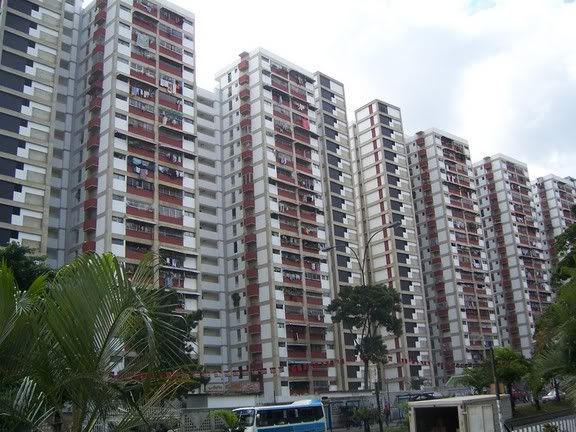
Appartment blocks in El Valle
However, most residents of El Valle don’t live in those buildings. Rather they live in the dwellings that have steadily climbed up the walls of the valley known as cerros. There is virtually no greenery to be seen as every inch of El Valle, no matter how steep, has been built on.
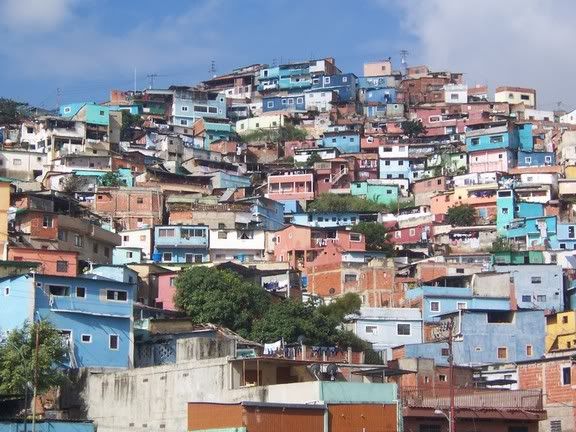
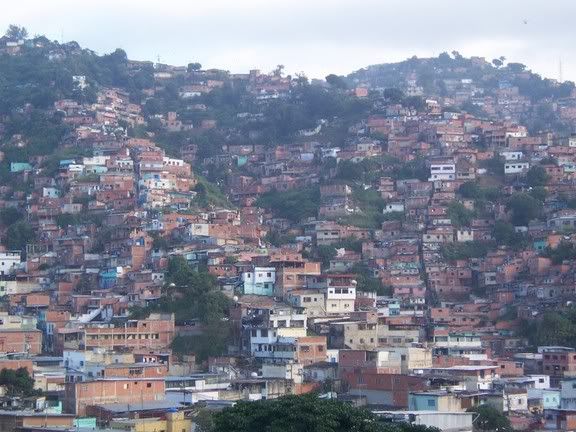
The result is El Valle is a very crowded urban environment and one of Caracas’s more populous neighborhoods.
In taking the bus in and out of El Valle every day I noticed I was passing a Mercal so I decided to stop in for a look. The day I went there it was actually closed for restocking. But after talking to two security guards I was able to finally speak to the manager who agreed to show me around and let me take some pictures.
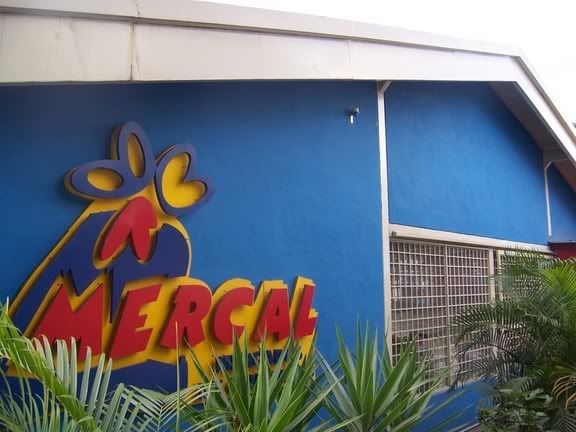
It wasn’t that large of a store but it seemed to be typical of the size of most Mercals – much smaller than a supermarket but about the size of a large delicatessen with 3 aisles of products. The very first thing I noticed was that contrary to what I had thought it didn’t just sell food. It also sold household cleaning products, personnel cleaning products such as shampoo, and other miscellaneous products that a typical consumer would buy.
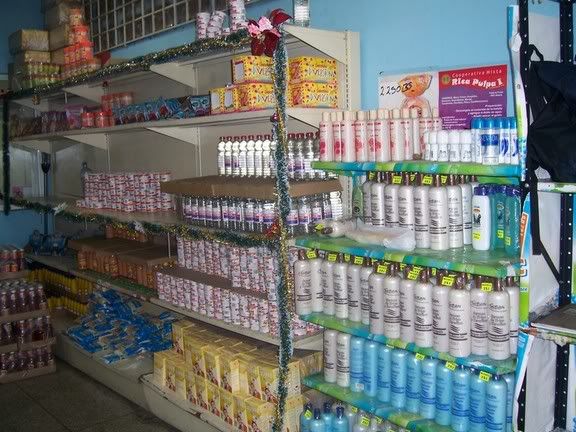
Personal hygiene and cleaning products in the Mercal
Next I saw several aisles of the products I had typically associated with Mercals – cooking oil, rice, beans, pasta, and the like.
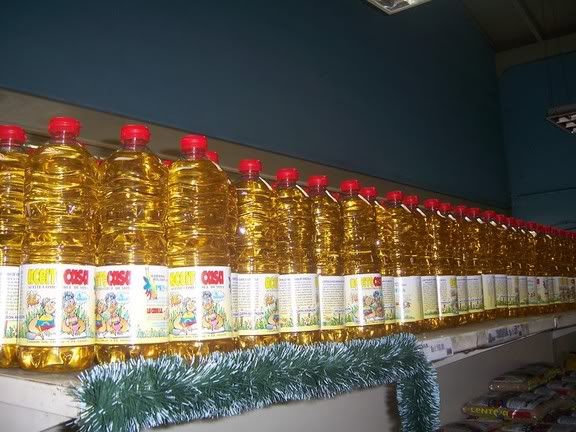
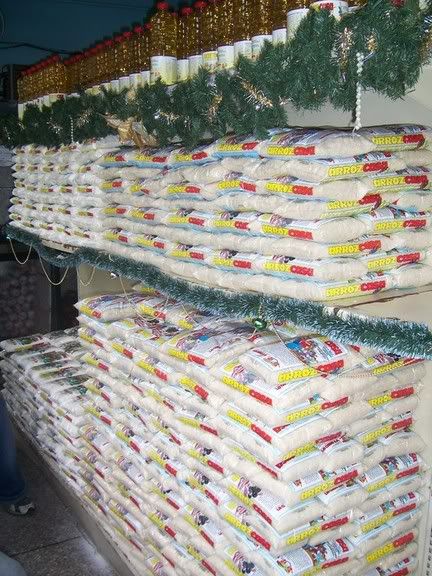
The basic foodstuffs were packaged in special wrappings for the Mercal often with political messages printed on them. They are made specifically for the Mercal and not sold anywhere else. However, there were also a lot of general items, particularly bread and meet, that were regular items that could be found in any supermarket in Venezuela.
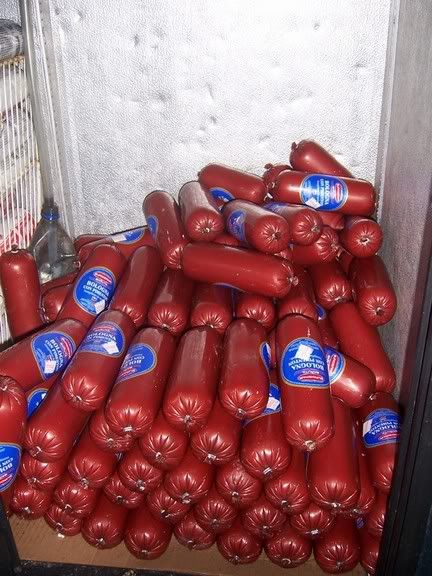
Packaged bologna in a Mercal
As far as the prices go the manager told me that they were generally about 30 to 35% less than what one would pay in a regular store. I didn’t check that for myself but I have seen price comparisons done by Ultimas Noticias and they generally give similar numbers. While these items are not being given away for free the steep discount is probably very valuable to people on a tight budget and may make the difference between having two meals a day or three meals a day. And this store does seem popular. Every day I passed it there where lines outside of 30 to 40 people waiting to get in. Further, this is only one store out of six that are in El Valle alone. And please note, anyone can shop in a Mercal regardless of what your income is.
Another interesting thing that the Mercal had that I didn’t expect was a small pharmacy. In this pharmacy they sold everything from over the counter cold and allergy remedies to prescription medications. And on all these items the discount is much greater – these items cost only 20% of what they would cost in a regular pharmacy.
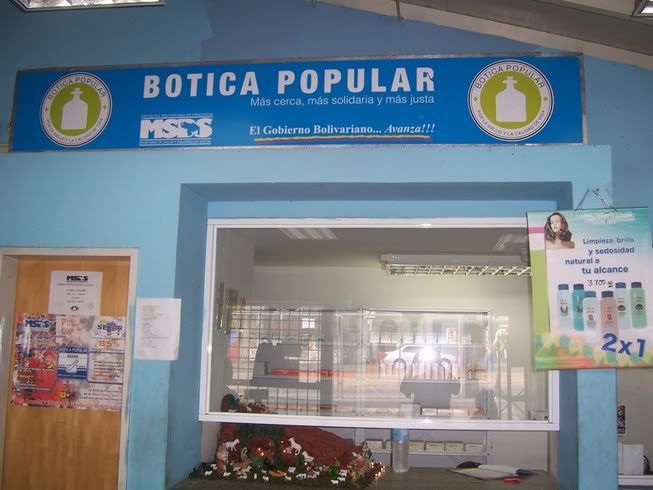
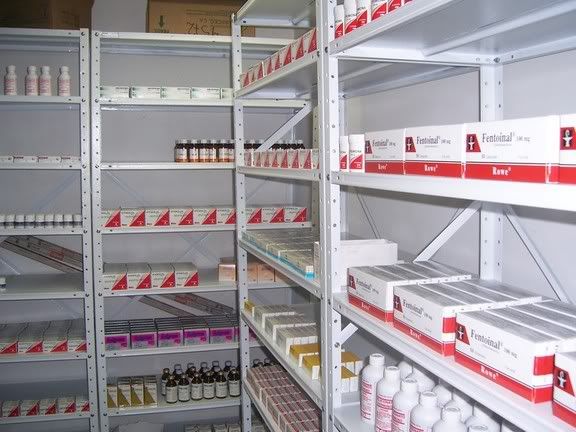
Another interesting touch to the pharmacy was that to get anything there, even over the counter items, you needed a doctor’s note or prescription. Nothing would be dispensed without a doctors written request. Seeing as Venezuelan’s now have easy access to medical care through the Barrio Adentro program this does not represent an obstacle to getting needed medications. But it does help to prevent the abuse and overuse of medications so typical of regular Venezuelan pharmacies where even prescription items are regularly sold without prescriptions.
There is another very interesting twist to all of this. The opposition, and much of the middle class, has often criticized Mercal as wasteful populism just meant to give away freebies and “buy” votes. But this actually turns out to be a completely hypocritical stance. A very large percentage of the middle class, and opposition, actually work for the government. This entitles them to a food subsidy that pre-dates Chavez called the CestaTicket. This CestaTicket are something akin to food stamps and every government worker gets them in the amount of 12,000 bolivares, about $5, for every day they work. This doesn’t cover their entire food expense but it does cover most of it. So it is more than a little ironic that while the government gives these middle class people essentially free food they later complain about the "populism" of the Mercal stores.
|
Wednesday, December 14, 2005
Weapons of Mass Development
The WMDs of Venezuela
By Charlie Hardy,
Posted on Wed Dec 14th, 2005 at 11:53:45 AM EST
I have often said that my living in Latin America the past twenty years has been similar to being hit over the head daily, but in a very positive sense. I have had to see so many things from an entirely different perspective.
It probably should not have been a surprise to me, therefore, when I heard a Venezuelan colonel tell a group of visitors from the U.S. that Venezuela was in possession of missiles.
Then he clarified the matter.
He said the missiles, which Venezuela has and is already using, are missiles with books, missiles with medicines, missiles with food. I think you might interpret this as saying that Venezuela possesses WMDs – Weapons of Mass Development.
Linguistically we are products of our times. And too often the media and those who hold the reigns of governments dominate our ways of thinking and the meanings of words and symbols. Entering the twenty-first century, the word “war” brings to mind Iraq and Afghanistan and the great excuses for every abuse that a government can perpetrate: “the war on terrorism” and “the war on drugs.” We forget that even in the United States of American there was once a positive use of the word “war,” the “War on Poverty.”
The word “weapons” brings to mind the billions of dollars that are spent on destruction throughout the world. A common dictionary definition says that a weapon is something used to injure, defeat or destroy. We have been locked into the idea of injuring and the negative connotations of “defeat” and “destroy” and have overlooked the possibility that the word “weapons” could also be used positively (e.g., for books and food) as means to defeat and destroy problems such as illiteracy and hunger.
I listened very carefully to the closing remarks of the Latin American presidents who were at the Mercosur meeting in Montevideo, Uruguay, last week. They spoke repeatedly about the threats to democracy in the region. But in their remarks, and possibly I missed something, I didn’t hear any of them referring to the need for a “War on Terrorism” or a “War on Drugs” to protect democracy. They did speak repeatedly about poverty and inequality as the menaces in today’s world that had to be overcome. In spite of the fact that the meeting was about trade agreements, the emphasis seemed to be more on social development than economic development. The second was of importance only in relation to accomplishing the first.
In that connection, President Hugo Chávez of Venezuela spoke of the concept of “free zones.” To those who travel to foreign countries, “free zones” bring to mind the Duty Free Shops that populate the international airports. To those involved in commerce, “free zones” provoke the thoughts of free trade.
But Chávez said that the world needed to begin to speak not only of free trade zones but also of: “zones that are free of illiteracy, zones that are free of malnourished infants, zones that are free of abandoned women living alone with their children in shacks, zones that are free of youth who are not able to finish their secondary education, zones that are free of young men and women who finished high school with hard work and who now can’t go to college; zones that are free of the street children that fill our cities; zones that are free of exclusion, exploitation and misery.” He added, “We can plan for this and we must plan for this. If we, who are political leaders, can plan for economic development we are even more obligated ethically to plan for social development.”
So, once again, I feel like I’ve been gently hit on the top of my head and my brain is spinning a bit. Leaders here are speaking a different language. But happily these linguistic thumps don’t bring me to the medicine cabinet for an aspirin; they do bring a smile to my face and give me hope for the future of our world.
Other essays by Charles Hardy can be found on his personal blog Cowboyincaracas.com . You may write him at cowboyincaracas@yahoo.com.
This essay really resonated with me for one particular reason. He makes reference to the "War on Poverty" that was carried out by Lyndon Johnson in the 1960's. I was quite young during it and have no first hand memory of it.
But recalling that time serves to remind me how far the U.S. has regressed. The U.S. did have governments, that while pro-capitalist, did believe it was their role to improve the welfare of the population. The New Deal, the War on Poverty, and even the turn of the century Progressive Movement were examples of this. And the U.S. had politicians who ranked right up there with Hugo Chavez in terms of their belief in what government can and should do to address social wrongs. Huey Long, who was only prevented from becoming President by an assasins bullet, comes to mind.
Yet for any American in their mid-40s or younger they are likely to know nothing but right wing governments of varying degrees with whom the only question is how far they will be able to roll back the hard won gains of previous generations. And even the one or two progressive ideas, such as Clintons desire for a national health plan, never seem to last more than a month or two. As Mr. Hardy points out Americans too once dreamt of building a better society, one without poverty and illiteracy, without wars of conquest but with social justice. And we too had our own version of "missions" to help get us to that better society. But it is so long ago now and we are so far removed from it, not even daring to dream about those things anymore, that it is hard for us to remember it ever existed.
That is one of the things that makes for such an incredible contrast between the current governments of the United States and Venezuela. The U.S. is a very wealthy country with a high standard of living. Yet every year the question seems to be how many more decent jobs will disappear, how many more people will have to reconcile themselves to a lower standard living, how many more people will join the ranks of the poor and uninsured, or how many more hours they'll have to work just to pay the bills. Venezuela is of course a much poorer country and its citizens have a much harder life. Yet for now things have turned the corner with the standard of living going up, poverty being reduced, education being improved and just the overall quality of life being better - if not a lot better at least somewhat better.
It is often said that it's not where you are that counts, but where you are going. I think that is why Charlie Hardy's essay so resonated with me. Although those in the U.S. in many ways enjoy a privaleged position we have now spent several decades going backwards - being less than what we once were. It shouldn't be then such a surprise that we sometimes look with envy upon Venezuelans who, although they have a very long and hard road ahead, have at least begun to take steps in the right direction.
|
Where it is truly dangerous to be a journalist
And do you want to take a stab at what country doesn't have a single solitary journalist in jail? Yep, you got it, Venezuela. Maybe the next time someone at the U.S. State Department goes mouthing off about the supposed risks to freedom in Venezuela someone should ask why then it is the U.S. that has journalists imprisonned while Venezuela doesn't.
|
Fast and furious
And that is not the end of the propoganda. For example, the article claims the PDVSA workers who were fired were fired for political reasons!! Well, maybe if you don't go on an illegal strike for the political reason of overthrowing the government you won't get fired! How's that for an idea.
Barely more than a week ago the opposition suffered yet another significant reversal. In what according to international observers were transparent elections they were wiped out of the National Assembly. So do we see any introspection and change in course? Nope. I'm just seeing the same strategy, the same denial, and the same tired lies. Venezuela needs a serious political opposition. But it doesn't look as though they'll be getting it anytime soon.
|
Tuesday, December 13, 2005
Facts, who cares about facts?
The only problem is that the PDVSA audited financial statements released a couple of months ago completely refuted the idea of a production shortfall and showed PDVSA was producing exactly what it said it had been producting all along. That is, in 2003 PDVSA got its production back up over 3 million barrels per day without needing any of the fired managers. So unless there has been some drastic change for the worse recently it appears Mr. Giusti is just straight out lying. And yes it is a lie because I'm sure that Mr. Giusti is smart enough to know how to log onto the U.S. Securities and Exchange Commission web site and read PDVSA's financial statements.
Of course this lie is being peddled to the private anti-Chavez media. That means Giusti isn't lying to Chavistas because they know better than to believe what gets said on Union Radio in the first place. In other words the people who are being decieved here are opposition supporters who still may place their faith in the opposition media. So when the opposition lies it is really just lying to its own supporters. Nice people, huh?
|
Do not pass go: go straight from the bingo parlor to jail
It should be fun watching all the opposition come out and say this is a political persecution. Sure, we all have the inaliable right to over throw the government!!!
Anyways, its about time some of these swine starting going to jail. A lot of people lost their jobs and went hungry because of what this idiot and his cohorts did. Attempts to overthrow the government that cost the nation billions of dollars it can ill afford to lose just can't be tolerated.
UPDATE Well, that didn't take long. Already the opposition is crying that this sentence is political in nature and is trying to crush dissent and intimidate people. I don't know, personally I think there is something to be said for intimidating people who try to overthrow democratically elected governments.
|
With an opposition like this how are we ever going to get anything done.
Hugo Chávez and His Helpers
The kind of lucky breaks President Hugo Chávez of Venezuela has been getting lately could tempt even a modest man - and Mr. Chávez is no modest man - to dream grandiose dreams. High oil prices, a terminally inept opposition and the Bush administration's scandalous neglect of its Western Hemisphere neighbors have left the field wide open for Mr. Chávez to bully people at home, buy friends abroad and annoy Washington at every turn.
Since first taking office in 1999, Mr. Chávez has pushed through a new Constitution that lets him rule as a quasi dictator. He has marginalized Congress, undermined judicial independence and prosecuted political opponents. By tightening control of the national oil company, he has been able to use high world oil prices to increase funds for popular social programs for the poor, making him electorally unassailable. That dangerous concentration of power will most likely worsen after last Sunday's Congressional election, in which parties allied to Mr. Chávez won every one of the 167 seats. The opposition can blame only itself because it boycotted the polls even after its demands for stricter ballot secrecy were met.
That petulant idiocy frustrated regional diplomats who had pressed the secrecy demand on the opposition's behalf, and it mystified and disenfranchised Venezuelan voters who had wanted a choice at the polls. Even without the boycott, pro-Chávez parties would have won a majority. But now not a single opposition voice will be heard in Congress, and Mr. Chávez is free to do whatever he likes.
A month earlier, at the Summit of the Americas in Argentina, Mr. Chávez cavorted before crowds of anti-Washington protesters and networked with his fellow Latin American presidents. He is hoping that either Argentina or Brazil will sell him a nuclear reactor, a step that would be a very bad idea considering Venezuela's burgeoning friendship with Iran and the excessive indulgence Caracas has shown toward Iranian nuclear ambitions.
Meanwhile, Washington's hemispheric influence continues to dwindle, partly because President Bush has not been attentive enough to Mexico on immigration, Brazil on agricultural subsidies and Argentina on debt restructuring.
The United States should not further feed Mr. Chávez's ego and give him more excuses for demagogy by treating him as clumsily as it has treated his hero and role model, Fidel Castro, for the past four and a half decades. Instead, Washington needs to compete more deftly and actively with Mr. Chávez for regional influence, and look for ways to work with the hemisphere's other democracies to revive the multiparty competitive democracy that has now just about ceased to exist in Venezuela.
Is it just me or does this editorial very much have the tone of "with as stupid an opposition as there is in Venezuela how are we going to over get rid of Chavez?" The editorial certainly makes it clear the Times has no use for Chavez but they are clearly fustrated by the "petulant idiocy" of the opposition. Can't say I blame them.
Then we have the Washington Post chime in asking if the opposition really believes itself in democracy:
Mr. Chavez's Rubber Stamp
Monday, December 12, 2005; A24
VENEZUELA'S democratic system, which has been crumbling under pressure from President Hugo Chavez, has taken another lurch toward collapse. In elections for the National Assembly held Dec. 4, at least 75 percent of voters chose not to go to the polls, despite threats from government officials that state workers would lose their jobs if they did not. A fifth of those who did turn out cast blank ballots rather than support pro-government candidates; opposition parties withdrew from the election days before it occurred. The result is that Mr. Chavez's supporters, with a mandate from 20 percent of the electorate, will occupy all 167 seats in the assembly. The legislature, like the court system before it, will be converted from a check on Mr. Chavez's power to a rubber stamp. Its top priority, National Assembly President Nicolas Maduro said after the vote, would be "to legislate so that Chavez rules not until 2021, but until 2030."
Responsibility for this grievous development lies in part with the Venezuelan opposition, which according to polls stood no chance of defeating Mr. Chavez's party when it chose to boycott the election. Opposition leaders pointed to flaws in the voting system that might have prevented secret balloting, but this seemed a pretext after election authorities agreed to make changes. By withdrawing, the opposition made it impossible to challenge Mr. Chavez through a democratic legislature and renewed questions about whether its commitment to democracy is any greater than that of the president. Like Mr. Chavez, some opposition leaders once backed a military coup. Its disastrous failure ought to have established the principle that only a movement clearly committed to democracy can hope to defeat Mr. Chavez's plans for a "21st-century socialist revolution."
It is those plans that have been the main cause of Venezuela's turmoil and the disintegration of a flawed but free political system. Mr. Chavez's supporters control the national election authority, and missions from both the European Union and the Organization of American States found that much of the public distrusts the electoral system. Mr. Chavez has cowed the privately owned opposition press with a draconian anti-slander law and charged the leaders of the independent election-monitoring group Sumate with treason for accepting $31,000 in funding from the National Endowment for Democracy. Other criminal cases have been brought against prominent opposition politicians, trade unionists and human rights activists.
The OAS mission suggested that Venezuelan democracy might still be rescued through "a frank, inclusive and good-faith dialogue" between Mr. Chavez and the opposition that, among other things, would be aimed at "strengthening of the principle of separation, independence and balance of powers -- a basic principle of all presidential democracies." For now, such a democratic balance is utterly absent in Venezuela; and judging from Mr. Chavez's conduct, that is exactly what he wants.
Its interesting to see that the Washington Post, who have consistently slammed the Chavez government, are finally starting to see that the current opposition is a complete joke. I guess they are getting a little fustrated with an opposition which, in spite of tens of millions of dollars invested in them by the U.S. government, is so clownish that they pull out of elections after their demands are met. Its further good to see that this paper which has not hesitated to use crude and inaccurate propaganda against the Venezuelan government in the past acknowledges what the boycott was really all about - that it had nothing to do with the integrity of the voting process and resulted from the opposition knowing it was going to lose big anyways.
It is clear that the U.S. leadership is waking up to the realization that the first problem they need to deal with in Venezuela is the complete stupidity and incompetance of the people who currently make up the opposition. It will be interesting to see if the U.S. embassy in Caracas starts taking a much more pro-active roll in disposing of the current opposition and trying to build a new one. I think U.S. ambassador Brownfield is going to be a very busy man for the next couple of years.
|
Monday, December 12, 2005
Treading on dangerous ground
All of this serves to make Caracas a very ugly and almost unlivable city. Yet more people keep pouring into it from other parts of the country due to it being the economic center of the country and where most of the well paying jobs are to be found.
Given that there is virtually no unused space around Caracas it was inevitable that eventually would turn their eyes to the huge park to the north of the city on a mountain known as El Avila. This mountain is known as the "lungs" of Caracas and also serves as a very welcome respite to unrelenting ugliness of the concrete and glass jungle that is Caracas. But according to news reports the government is even considering allowing part of El Avila be used to build housing.
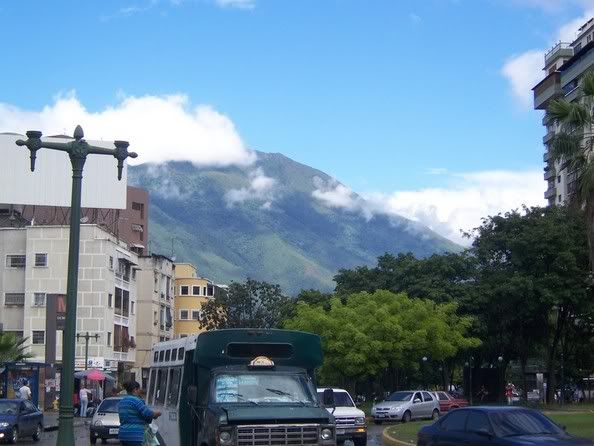
The Avila mountain range seen from a Caracas street
While the government claims its current ideas are just land swaps and wouldn't result in any overall reduction in the size of the park we would do well to meet and such claims with skepticism. Oppenents of the plan fear starting building in the park would be the preverbial camel nose under the tent and would result in the park soon being overrun with squatters and makeshift housing. Further, it is rightly pointed out that it is simply not a good idea to build on the steep mountain ridge as it is prone to landslides after heavy rains. It was such landslides that led to the deaths of thousands in 1999 in Vargas which is just the north face of El Avila.
Truthfully, I think the only real solution to Caracas's problems is to try to shift economic development out to other regions of the country. If the jobs move people will follow. Chavez used to speak about this quite a bit but little of late. But the idea of shifting development isn't something that should just be forgotten about - it really is a compelling necissity.
Further, it wouldn't be all that hard to do. The government sector could do most of it on its own. For example, the state oil company, PDVSA, has its headquarters in Caracas. Yet there is no oil produced around Caracas. Maybe it would make more sense to move it and thousands of jobs with it to Maracaibo which is much more closely tied to the oil fields. Other government offices can and should be moved away too. It really is amazing how centralized the federal government is in Caracas. For example, if you purchase are car in Barquisimeto you can't register it and get a title to it there. You have to travel 4 and a 1/2 hours to Caracas to do that as that is where the motor vehicle office is. This serves to concentrate jobs in Caracas and make what should be simple tasks very difficult for the 80% of the population that lives in areas other than Carcas.
The bottom line is Chavez's original plans of trying to get people and jobs to move out of the Carcas area needs need to be revived. Otherwise Caracas will join the likes of Mexico City and Cairo as super cities with super slums that are simply unlivable and inhuman.
|
What do you get for the Chavista that has it all?
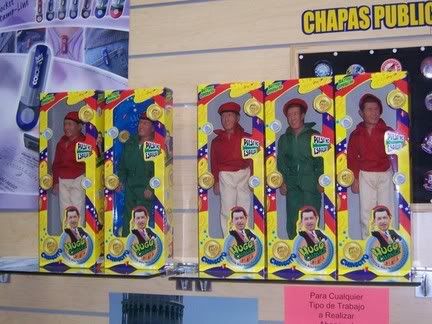
And no, I'm not selling, at any price. So don't even ask!
|
Sunday, December 11, 2005
Los Proceres shines
So for fluff posting let me just show the results of my walking from El Valle over to the nearby Los Proceres. For those who don't know, Los Proceres are located on the Tiuna military base in Caracas and are the main military parade grounds. They also contain a number of important monuments.
This area had fallen into significant disrepair over the years. However, the government has now rehabilited a good part of it, including putting the nice reflecting pool back into use for the first time in many years. Here are some pictures I took:
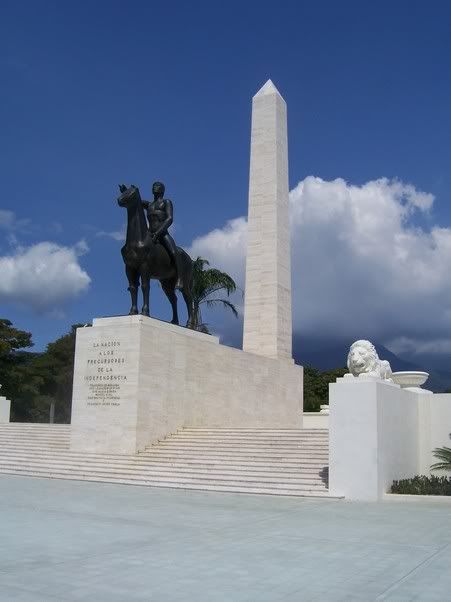
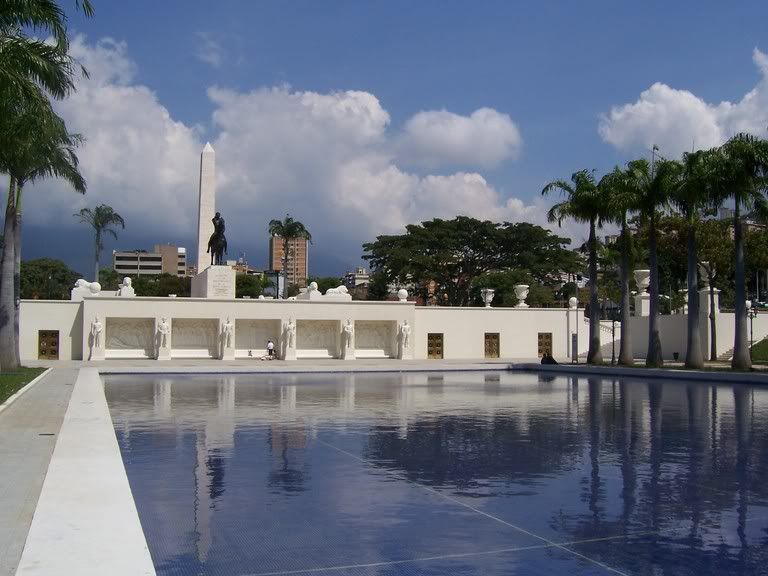
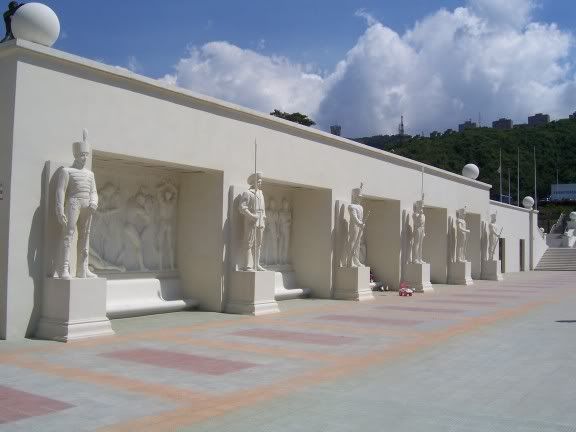
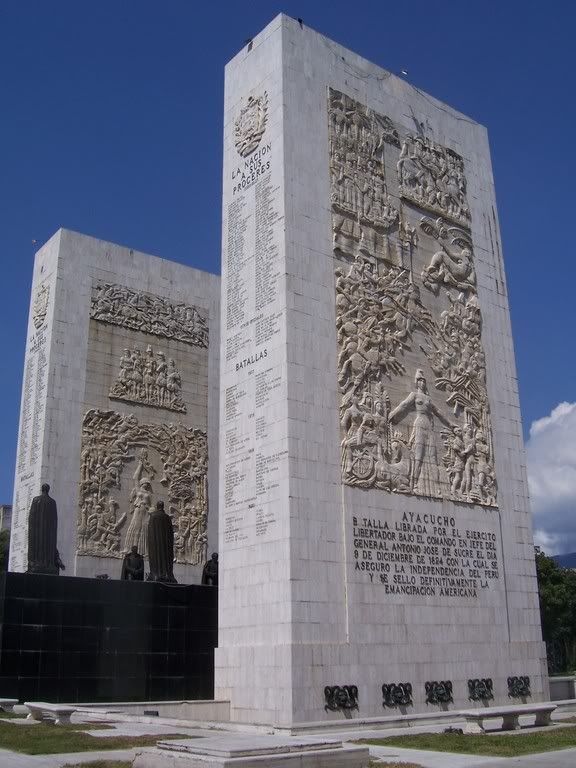
|
